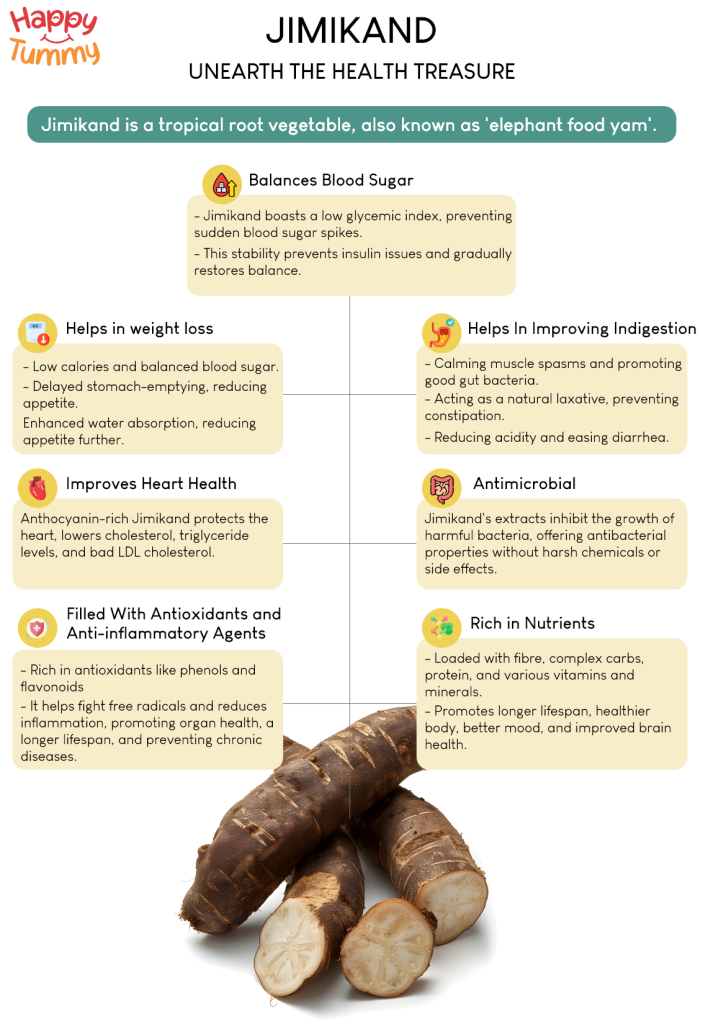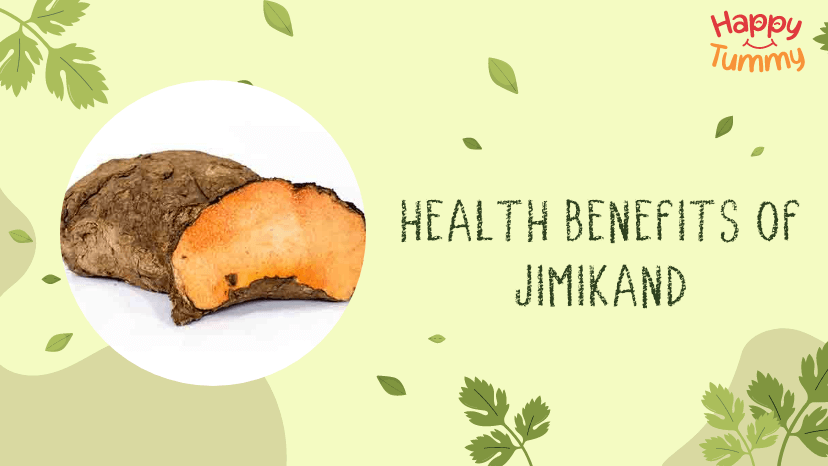Table of Contents
Remember going to a market and seeing a big, weird, dusty-looking vegetable? Chances are that it could be Jimikand. We all see it around in the market, sitting quietly in some corner, but rarely do we ask the vegetable seller to pack it for us.
Jimikand, or sooran kanda in Hindi, is a tropical root vegetable that is extracted after uprooting the jimikand plant. It is also known as ‘elephant food yam’.
If you’ve not tried this yam yet, you’ll so regret your decision after reading about its magnificent benefits and will buy it the very next day.
Jimikand Nutritional Benefits (per 100 grams)[1]
| Nutrient | Amount |
| Calories | 347 |
| Water | 10g |
| Carbohydrates | 71g |
| Fibre | 1.7g |
| Protein | 12.4g |
| Fat | 0.2g |
| Vitamins | Vitamin C, A, etc. |
| Minerals | Potassium, calcium, phosphorus, iron, zinc, magnesium, etc. |

1. Balances Blood Sugar
Sugar often resembles sweetness and joy. But rarely is this case when the modern lifestyle comes around. The disruption in blood glucose levels has been puffing up cases of diabetes. It is time we return to our traditional roots and pick up nature for our healing.
Jimikand has a wonderfully low glycaemic index, which does not spike your blood sugar level as soon as it enters your body. It releases energy smoothly over a long period of time. This prevents insulin instability and resistance and gradually brings it back to goodness. [2]
2. Wakes Up Your Weight Loss Element
Seeing ourselves losing that stubborn weight is a dream. But choosing Jimikand can help you realise this very dream.
- It is low in calories and balances blood sugar. This means restricted calorie intake and no sugar spikes
- It delays stomach-emptying, thereby reducing appetite and absorbing more nutrients
- It reduces appetite and enhances water absorption.
All these factors working together lead to a state of weight loss. [3]
3. Filled With Antioxidants and Anti-inflammatory Agents
Speak of antioxidants and speak of Jimikand or elephant yam. It is an evergreen combination. This veggie is rich in antioxidants like phenols and flavonoids. These very compounds help us combat free radical damage and also reduce inflammation in the body. Here is what it means for us:
- Fighting with free radicals means organs are protected from damage by free radicals. Thus, a longer lifespan, blooming organ health, and delayed ageing ensues.
- Chronic inflammation is the slow poison that eats our bodies from within without our knowledge. Prevention from it means better health and a painless life.
Numerous studies have found Sooran to be brilliant at tackling both these areas. [4]
4. Antimicrobial
Jimikand also has antimicrobial properties. Studies have found that its extracts can hinder the growth of some nasty bacteria, including ones like E. coli, S. aureus, etc. These bad bacteria mainly stay responsible for everything from stomach upsets to infections. [5]
So, how does it happen? Well, jimikand contains phenols, flavonoids, and terpenoids. All of these show antibacterial properties. And the best part? They do their job without any harsh chemicals or harmful side effects.
5. Helps In Improving Indigestion
Indigestion is brutal, not only because it is painful, but because it is the source of hundreds of diseases that uproot our peace in life. Jimikand also holds a hidden talent for preventing digestive derailment. Here is how:
- It can ease diarrhoea by calming the muscle spasms and promoting the army of good gut bacteria [6]
- Sooran is rich in fibre. This prevents the bad buildup in the guts and also terrible constipation due to its laxative properties [7]
- It can even reduce acidity, thereby preventing the stomach from burns
- Jimikand also helps in treating anorexia, which helps in reducing debility, weakness and improves your overall health. [8]
Take 10ml of jimikand juice if indigestion is troubling you
6. Improves Heart Health
Numerous species of jimikand are rich in anthocyanins. These pigments also act as antioxidants. When introduced to the body, they help protect the human heart against several types of issues. So, eating Sooran can protect your heart. [9]
Also, elephant yam lowers
- Cholesterol
- triglyceride levels
- And bad fat (LDL) as well
A fall in their levels is always good news for your heart. You must also make other necessary changes in your diet and lifestyle to increase its positive impact.
7. Rich in Nutrients
Jimikand contains an excellent amount of fibre, complex carbs, protein, Vitamin C, Vitamin A, and several minerals such as iron, potassium, phosphorous, zinc, copper, calcium, etc. [10]
A diet rich in essential nutrients leads to
- Longer lifespan
- Healthier body
- Better mood
- Improved brain health
And boasts numerous other benefits as well.
The Bottom Line
Jimikand is a rarely known vegetable in Indian kitchens despite it being an Asian vegetable. For centuries, it was used traditionally as a medicine due to its many benefits.
Also known as sooran or elephant yam, it is a treasure trove of health waiting to be unearthed. From balancing blood sugar and aiding weight loss to fighting free radicals and keeping your gut happy, it is true nature’s gift.
Embrace its weirdness, embrace its benefits, and embrace the joy of adding this versatile wonder veggie to your plate. Your body will thank you; one delicious bite at a time!
However, remember not to take it if you are already suffering from any skin disease or bleeding disorders. It can worsen the symptoms. Always consult a doctor.
So, the next time you see Jimikand in the market, don’t dismiss it as a dusty, weird vegetable.
FAQs
Jimikand, also known as elephant foot yam, is a tropical root vegetable native to India. Its large, tuberous roots characterize it and is commonly used in Indian cuisine for its unique taste and nutritional benefits.
Individuals with kidney issues should exercise caution when consuming elephant foot yam or any other food. Kidney patients should consult with their healthcare provider to determine the suitability of including Jimikand in their diet.
Jimikand is generally safe for consumption. However, excessive intake may lead to digestive discomfort, bloating, or gas. People with certain medical conditions should consult a healthcare professional before including it in their diet.
Due to its rich nutritional profile, Jimikand can be a nutritious addition to a pregnant woman’s diet. However, it is crucial to consult your healthcare professional to ensure that its consumption aligns with individual health conditions and dietary needs during pregnancy.
No. On the contrary, elephant yam is known to have a low glycemic index, which means it is less likely to cause rapid spikes in blood sugar levels. In fact, it is considered a beneficial food for individuals looking to manage blood sugar levels.
Yams, including elephant foot yam or Jimikand, contain oxalates, which can contribute to kidney stone formation. Individuals with a history of kidney stones should moderate their oxalate intake and consult with a healthcare professional for personalized dietary advice.















